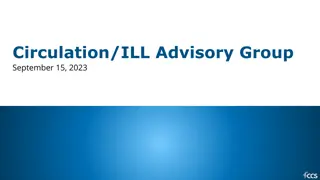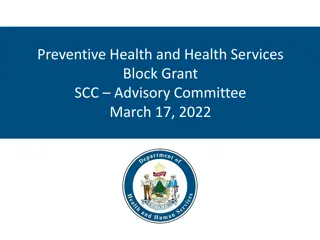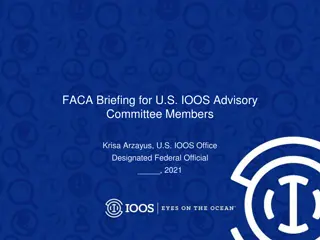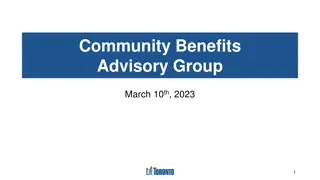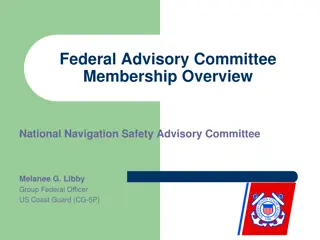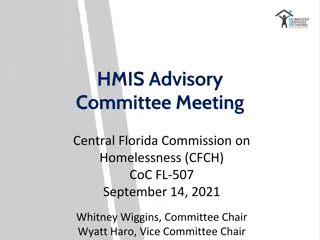
Community Health Worker Advisory Committee Meeting Decisions and Discussion
Explore the decisions and discussions from the Community Health Worker Advisory Committee's recent meeting. Topics include core competencies, training hours, modality, delivery methods, and more. Input from Carl Rush provides insights on educational program length and interactive learning approaches.
Download Presentation

Please find below an Image/Link to download the presentation.
The content on the website is provided AS IS for your information and personal use only. It may not be sold, licensed, or shared on other websites without obtaining consent from the author. If you encounter any issues during the download, it is possible that the publisher has removed the file from their server.
You are allowed to download the files provided on this website for personal or commercial use, subject to the condition that they are used lawfully. All files are the property of their respective owners.
The content on the website is provided AS IS for your information and personal use only. It may not be sold, licensed, or shared on other websites without obtaining consent from the author.
E N D
Presentation Transcript
Community Health Worker Advisory Committee Design Group 3 - Training April 11, 2018 1
Agenda 1. Introductions & Review decisions from March 20 meeting 5 min 2. Review of other states - Number of training hours 10 min 3. Discussion 15 min 4. Review of other states - Training modality/methodology & Training delivery................................................................................... 5 min 5. Discussion 15 min 6. Internship (begin discussion) . ... 5 min 7. Timeline & Next Steps . .. 5 min 2
Decisions made by Design Group 3 in March 20 Meeting (1 of 2) Design Group 3 made a reviewed and recommendation on the following Key Decision Point: 1. Content Identify Core Competencies* *Accepted the C3 Core Competencies previously decided on by the CHW Advisory Committee 4
Decisions made by Design Group 3 in March 20 Meeting (2 of 2) Design Group 3 decided the following Key Decision Points still need to be made: 1. Number of training hours 2. Training modality/methodology 3. Standards for instructional methods - now will be referred to as Training Delivery 4. Internship 5. Training vendor criteria 6. Instructor qualifications 7. How does the training program assess proficiency? 8. Determine/develop type of assessment *Key Decisions Points that are bolded and underlined are the ones we will focus on today 5
Input from Carl Rush (1 of 2) Regarding number of training hours, modality/methodology, delivery methods, internship: Most of these points can and should be debated on the Committee, with robust discussion of pros and cons No obvious answers/no clear consensus or best practice The required length of an educational program depends very much on defined core competencies and the definition of certified as to the implied level of proficiency CHW education should at least be based on adult learning principles. Lecture and quiz formats are to be avoided. 6
Input from Carl Rush (2 of 2) Regarding number of training hours, modality/methodology, delivery methods, internship: Due to the nature of the work, learning should be participatory and interactive. Many people recommend popular ed, but not everyone is comfortable with it or adept at it, so some adaptation is usually necessary. In-person is always best, and individual (independent) online learning is not a good idea, but hybrid and interactive TV modes can work, in recognition of the needs of smaller states and rural areas. An internship or practicum is highly recommended, the longer the better: my impression is most are 40-80 hours - it s a tool for student assessment as well as integration of learning. 7
Florida Number of Training Hours: Number of Training Hours: 30 clock hours of content specific training as follows Core Competencies (Performance Domains): Communication and Education: 4 clock hours Resources: 4 clock hours Advocacy: 4 clock hours Foundations of Health: 4 clock hours Professional Responsibility: 4 clock hours Electives (may relate to any of the performance domains): 10~14 clock hours yearly, used as CEUs for biennial recertification 9
Massachusetts Number of Training Hours: Number of Training Hours: 80 hours (48 hour training to be phased out) Core Competencies: 1. Outreach Methods and Strategies 2. Individual and Community Assessment 3. Effective Communication 4. Cultural Responsiveness and Meditation 5. Education to Promote Healthy Behavior Change 6. Care Coordination and System Navigation 7. Use of Public Health Concepts and Approaches 8. Advocacy and Community Capacity Building 9. Documentation 10.Professional Skills and Conduct 10
Rhode Island Number of Training Hours: Number of Training Hours: 70 hours of content specific training as follows Core Competencies: 1. Engagement methods and strategies 2. Individual and community assessment 3. Culturally and linguistically appropriate responsiveness 4. Promote health and wellbeing 5. Care coordination and system navigation 6. Public health concepts and approaches 7. Advocacy and community capacity building 8. Safety and self care 9. Ethical responsibilities and professional skills 11
Texas Number of Training Hours Number of Training Hours: 160 hours of content specific training as follows Core Competencies: 1. Communication 2. Interpersonal 3. Service Coordination 4. Capacity-Building 5. Advocacy 6. Teaching 7. Organizational Skills 8. Knowledge based on Specific Health Issues. 12
Summary - Number of Training Hours Number of Training Hours Number of Core Competencies State Florida 30 5 + elective 80 (48-hr training to be phased out) Massachusetts 10 Rhode Island 70 9 Texas 160 8 13
Connecticut Length of Training Housatonic Community College CHW Program 120 hours of lecture Optional internship Gateway Community College CHW Training Program 6 hours a day, 4 days a weeks for 11 weeks = 264 hours Additional internship Capitol Community College 3 hours a day, 3 days a week for 12 weeks = 108 hours Additional 12 hour course in order to receive certificate Southwestern AHEC 56 hours of Core Competency 16 hours Motivational Interviewing 8 hours MHFA Training 14
Connecticut - Number of Training Hours How many hours of training should be recommended for Connecticut? 15
Training Modality/Methodology & Training Delivery 16
Rhode Island - Training Modality/Methodology Primarily use a didactic training model Use different speakers for each section based on presenter expertise 20
Massachusetts Training Delivery CHW trainings are in-person Have a Patient Navigator training course offered as a hybrid class 21
Rhode Island Training Delivery All in-person training No online modules 22
Texas Delivery Methods Training available face to face or online depending on the training program offering the course Over 30 trainings offered throughout the state 23
Training Modality/Methodology & Delivery Methods What type of training modality/methodology should be recommended for Connecticut? What type of training delivery methods should be recommended for Connecticut? 24
Internship 25
Internship What is an internship? Should an internship be included as a part of CHW training? How long should it be? 26
Timeline 27
Timeline April 17th Date TBD May 15th Design Group 3 Meeting (In- person) Design Group 3 Phone Call *Between in-person meetings Design Group 3 Meeting (In-person) Key Decisions Points Key Decisions Points Internship Key Decisions Points Anything still undecided or needing further discussion Training Vendor Criteria How to assess proficiency? Instructor Qualifications Type of Assessment 28
Next Steps 29

